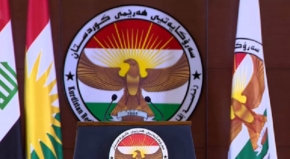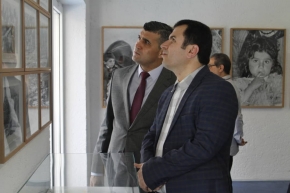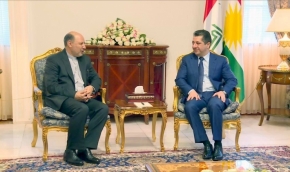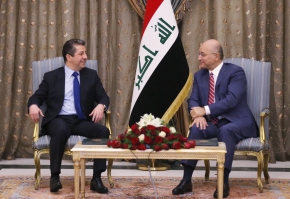Prime Minister Masrour Barzani meets the Foreign Minister of Iran in Munich
Munich, Germany (GOV.KRD) – Prime Minister Masrour Barzani met with the Foreign Minister of Iran, Mohammad Javad Zarif, at the Munich Security Conference today.
During the meeting, they discussed the latest developments in Iraq and the wider region. They agreed that they have an obligation of maintaining good neighbourly relations and mutual respect. They also have a common recognition of regional security challenges.
Prime Minister Barzani and Minister Zarif reiterated their support to de-escalate tensions in Iraq and further contribute towards stability in the region.
Prime Minister Masrour Barzani on visit to Rome and Vatican City
Erbil, Kurdistan Region, Iraq (GOV.KRD) - Prime Minister Masrour Barzani has arrived today in Rome for a two-day visit to the Italian capital and Vatican City.
Prime Minister Barzani is leading a KRG delegation including Dana Abdulkareem Hamasalih, Minister of Housing and Reconstruction; Ano Jawhar Abdulmaseeh Abdoka, Minister of Transport and Communications; Pshtiwan Sadq Abdullah, Minister of Endowment & Religious Affairs; and Khalid Salam Saeed, Minister of State.
In Rome, Prime Minister Barzani will hold bilateral meetings with senior members of the Italian government, including Prime Minister Giuseppe Conte, to discuss ongoing bilateral cooperation in the fight against global terrorism. They will also consider ways of encouraging Italian companies to seize the business opportunities available in Kurdistan by investing in the region.
At the Vatican, Prime Minister Barzani will meet His Holiness Pope Francis and Secretary of State Pietro Parolin to discuss the Kurdistan Region's commitment to countering religious persecution and promoting interreligious dialogue.
Ahead of his visit, Prime Minister Barzani said: "I am delighted to be meeting His Holiness the Pope to discuss the importance of religious coexistence, which can be a valuable antidote to extremism. I am proud that the KRG has made such a major contribution through our long-standing efforts to promote interreligious dialogue, while creating a haven of tolerance in the Kurdistan Region for people of all faiths."
A statement from Kurdistan Region Presidency on recent events in Iraq and the wider region
The recent events in Kirkuk and Qaeim and at the US Embassy in Baghdad indicate there is a further exacerbation of the situation in Iraq, which has created a cycle of action and counteraction. Therefore, we reject all steps by other countries to settle scores on Iraqi soil and violate Iraqi sovereignty. As a result of these events, General Qasim Solaimani, the commander of the Quds Force, and Abu Mahdi Al-Muhandis, Deputy Leader of the Popular Mobilization Force, and their comrades lost their lives while both of them played a prominent role in the fight against ISIS terrorists in the past few years.
Iraq must not become a battleground for other countries to settle their disputes. We urge them to solve their problems through dialogue and to respect Iraq and its sovereignty. The continuation of these complications, actions and reactions, will push Iraq and the region towards an abyss and an uncertain future; it will also lead to the resurgence and strengthening of extremist and terrorist groups, such as ISIS.
In these complex, sensitive and dangerous circumstances, we urge all concerned parties to exercise maximum self-restraint and prevent any further dangerous escalation.
Iraqi Kurdish envoy attend "Climate of Wonder" photo exhibition in Tehran
Mansour Jahani - The "Climate of Wonder" photo exhibition by Mohammad Sayyad opened at the Nabashi Gallery in Tehran attended by the representative of the Iraqi Kurdistan Government in Iran Salam Aref Roshdi.
Mohammad Sayyad, a senior Iranian photographer, has been active in this field for nearly 50 years and is one of the leading news photographers in Iran.
The exhibition comprised 100 photos which depicts the horrific and devastating catastrophe of Halabja's chemical bombardment, the unwanted fleeing of the Iraqi Kurdish people.
Sayyad also has tried to illustrate the pains of the Kurdish nation at that critical juncture.
Representing the Iraqi Kurdistan government in Tehran also congratulated Sayyad and expressed hope that in the near future these photos would be published and distributed to everyone in Kurdistan and around the world.
PM Barzani Receives New Iranian Consul General in Erbil
ERBIL — Kurdistan Region Prime Minister Masrour Barzani received on Monday the new Iranian Consul General to Erbil.
Barzani and Nasrollah Rashnoudi reviewed the bilateral ties during a meeting and discussed the possibilities to foster Erbil-Tehran relations, especially in the areas of trade and economy.
The new Iranian consul general congratulated PM Barzani on the formation of the new cabinet of the Kurdistan Regional Government (KRG).
In return, PM Barzani wished Rashnoudi success in his new position, according to the Kurdish readout of the meeting.
THE PRESIDENT WELCOMES THE KRG PRIME MINISTER
President Barham Salih greeted the Prime Minister of Kurdistan Regional Government (KRG) Masrour Barzani, and the accompanying delegation, at the Presidential Office in Baghdad on Tuesday, July 16, 2019.
The President highlighted the importance of coordinating shared visions and adopting the language of constructive dialogue to resolve all lingering issues between the Federal government and the KRG in accordance with the Constitution and national interest and to achieve justice.
President Salih expressed confidence in achieving consensus among political parties to elevate the level of relations and overcome obstacles to delivering services to the Iraqi people.
For his part, Mr. Barzani expressed his government's desire to intensify dialogues and recourse to the Constitution thus to ensure the realization of common interests and the enhancement of brotherly relations.
The meeting also discussed the political developments at the regional and international levels.
https://presidency.iq/EN/Details.aspx?id=1487
New KRG Prime Minister Promises to Strengthen the Region and Introduce Widespread Reforms following Inauguration
Erbil, Kurdistan Region, Iraq (GOV.KRD) - The Kurdistan Parliament has confirmed Mr Masrour Barzani's appointment as Prime Minister of the Kurdistan Regional Government (KRG), together with the ministerial cabinet.
Following his inauguration, Prime Minister Barzani vowed to make Kurdistan stronger, improve ties with Baghdad and diversify the region's economy.
The Prime Minister said: "After working since September 2018 to put together a truly inclusive government, my commitment now is to work together with every party and every part of our nation to build a strong KRG that serves the people, not the other way around. We cannot succeed in building a strong government if we allow petty divisions and small disagreements to drive us apart."
The Prime Minister called for further progress in developing a stable and constructive partnership with Iraq's federal government.
"Erbil and Baghdad both want security and prosperity, built on a foundation of mutual respect and cooperation," he said. "This will include securing our rightful share of government revenue, by settling once and for all the division of revenue formula that determines the annual budget allocation for Kurdistan."
Concerning Kurdistan's economy, Prime Minister Barzani highlighted the region's over-reliance on oil and gas, and promised to overhaul the public sector.
"We must ensure our government serves the people of Kurdistan in a fully transparent and accountable manner," he said. "This will include securing the public finances to pay down our debts, introducing regulatory reforms that allow businesses to thrive, attracting more foreign investment and enabling the development of new infrastructure."
The Prime Minister called on the international community to support Kurdistan's new government and its reform programme, while helping to protect the region's status as a haven for persecuted and displaced people.
"Today, around 1.25 million internally displaced people from elsewhere in Iraq live in Kurdistan, alongside almost 275,000 refugees from neighbouring countries,” he commented. "We hope our friends and allies will continue offering their support to Kurdistan, as we remain a haven of tolerance in an uncertain part of the world."
For more information about the KRG's new cabinet, visit https://gov.krd/government/the-cabinet/.
Please direct media enquiries to This email address is being protected from spambots. You need JavaScript enabled to view it.
Nechirvan Barzani holds talks with French President Macron in Paris
ERBIL, Kurdistan Region – Nechirvan Barzani, president of the Kurdistan Region, held talks on Wednesday with French President Emmanuel Macron at the Elysee Palace in Paris. He said Macron accepted an invitation to Erbil.
Speaking to journalists after their short meeting, Barzani said he thanked Macron and France “for helping us in the case of [Kurdistan] Region and Baghdad relations. This was one of the main subjects of today’s meeting with His Excellency”.
They also discussed improving relations between Erbil and Paris both “economically and politically”.
Barzani said he also thanked France for its support in the war against the Islamic State (ISIS) and the humanitarian aid effort.
He said Macron has accepted an invitation to visit the Kurdistan Region.
Macron also wished the new Kurdistan Regional Government (KRG) success, Barzani added.
Both sides discussed the latest security and political developments in the region, Erbil-Baghdad relations, and issues and efforts to resolve them based on the Iraqi constitution, and internally displaced people and refugees condition in the Kurdistan Region and how to help them return to their areas,” according to a readout from Barzani's office.
Macron “expressed France’s gratitude and acknowledgement to Kurdistan Region for encountering and defeating terror and hosting internally displaced people and refugees as well as protecting religious and ethnic groups in Kurdistan Region,” according to the readout.
Both presidents also discussed business and investment opportunities for French companies.
The French president is yet to issue a statement on their meeting.
Barzani later met with French Foreign Minister Jean-Yves Le Drian.
“The role of the international community, typically France, in the return of the internally displaced people to their areas” was one of the subjects discussed, according to a readout from Barzani’s office.
After Kurdistan abruptly stopped oil exports to Iran - and then quickly resumed them - the KRG's emissary to Tehran discusses bilateral relations in the age of renewed U.S. sanctions.
By MOHAMMED HUSSEIN of Error! Hyperlink reference not valid. Published Friday, March 1st, 2019 SULAIMANIYA - The Trump administration's decision to re-impose sanctions on Iran has forced the Kurdistan region - like the rest of Iraq - into a difficult balancing act. The U.S. government has provided the Kurdistan Regional Government (KRG) with essential military and financial support; yet as a neighboring country, Iran has built long-term economic, security, and political ties that cannot be quickly or easily altered. One case in point came on Feb. 14, when the KRG Ministry of Natural Resources (MNR) - under U.S. pressure - issued an order banning all exports of crude and fuel to Iran. A week later, the MNR issued a follow-up directive that clarified the earlier order was only meant to stop illicit smuggling; licensed refiners and permit holders could once again send trucks through KRG crossing points into Iran. Nazm Dabakh is the KRG's representative in Iran. (As an autonomous region, the KRG does not have a formal diplomatic presence in Tehran, but Dabakh essentially functions as an official emissary.) He spoke with Iraq Oil Report by phone about the state of Iran-KRG relations, the see-sawing orders from the MNR, and the challenges of diplomacy with Iran in the era of renewed U.S. sanctions.
Mohammed Hussein: How do you see trade relations between the Iraqi Kurdistan region and Iran?
Nazm Dabakh: I think the current trade relations between Iraqi Kurdistan and Iran are fragile, weak, and unstable. Trade activities need guarantees, security, and normal exchange of money. Currently, none of these conditions exist.
MH: The volume of trade in both directions seems to be increasing. Why do you say the relations aren't stable?
ND: Traders on both sides have a hard time exchanging money to U.S. dollars. They are suffering with very volatile money exchange rates. They also have issues transferring money. All these factors made their market unstable. However, trade and economic relations between Kurdistan and the Islamic Republic of Iran are still ongoing. We have always tried to get the Kurdistan region to organize its relations with Iran within the framework of the Iraqi federal government.
MH: Do you mean the Kurdistan region can’t have any special relations or commercial exchange with Iran, apart of what Baghdad has?
ND: Yes, Kurdistan’s relations have always been treated as part of the relations between Iraq and Iran. We are totally committed to Iraq’s foreign relation policy. It also complies with the agreements between Erbil and Baghdad. It is part of the bigger agreements Erbil and Baghdad have reached to put border crossings back under the control of thefederal government.
MH: Sometimes the KRG's decisions are not stable regarding trade relations with Iran. Just this month, Kurdistan halted all oil exports to Iran, and then a week later issued another clarifying that all the refineries and companies that have proper permits are exempt from the export ban.
ND: I do not see it as instability in Kurdistan’s trade policy. In the first place, when the order of the export ban was issued, I said it was a temporary decision, and would not last for a long time. If Iraq does not stop its oil exports to Iran, why would we stop it? [Editor's note: The federal Oil Ministry says it stopped all export trucking to Iran before U.S. sanctions snapped back into effect in November 2018.]
MH: If Erbil organizes its relations based on Iraq’s foreign trade relations with Iran - and if Iraq has no such ban, as you say - why would Erbil ban the oil exports in the first place?
ND: The Kurdistan Regional Government has its own reason to ban the oil exports. It basically wanted to prevent oil smuggling.
If you look at the second order, it clearly allows [exports from] all the refineries and companies that have work permits in Iraq and Kurdistan. Therefore, I can say that the export ban was as an effort to prevent oil smuggling.
MH: Do you think the second order, to exempt permitted refineries and companies from the export ban, was issued because of diplomatic contact between Kurdistan and Iran?
ND: No. I think it was purely based on Kurdistan’s interests. Why would you ban oil exports to Iran while the same exports are ongoing from all other places to Iran? Why should Kurdistan alone undermine its interests and trade relations? Meanwhile, preventing oil smuggling is also in favor of Kurdistan. So, I can say the both orders were issued based on Kurdistan’s interests, not anything else.
MH: You said that one reason behind the MNR's Feb. 14 order to ban exports was an effort to prevent smuggling. Are Iranian officials also concerned about smuggling? If so, what actions are being taken or proposed within Iran to combat this?
ND: I can talk only about the Kurdistan government's position, which is clearly against smuggling. The order to ban oil exports was aimed at preventing the trade of any smuggled oil.
https://www.iraqoilreport.com/news/qa-nazm-dabakh-krg-representative-to-iran-37587/
Warnings of closing the border between Iraq and Iran
The tension in the southern provinces of Iraq and its impact on the border between Iraq and Iran has raised fears of the closure of the border between the two countries, including the border with the Kurdistan Region, as the relevant authorities in the provincial government the risks of those possibilities.
Sulaymaniyah Chamber of Commerce deputy Nozad Ghafoor said in a press statement that so far there is no possibility of closing the borders of the international region because of the tensions that occur in a number of Iraqi provinces.
But if tensions grow and continue, it is likely to raise concerns among neighboring countries and become a reason to close the border with Iraq and the region.
On the impact of the border closure in the region, the First Deputy of the Chamber of Commerce of Sulaymaniyah said in a press statement that because of the lack of infrastructure in the region and if Turkey and Iran to close the border with him, it means causing the suicide of the region.
He added that the region is now working on preparations for the construction of large complexes to store the needs, but these preparations did not come into force.
For his part, the representative of the regional government in Iran, Nazim Dabbagh said in a press statement that until the Iraqi government remains in power, the prospects of Iran to close the border with the region a few, adding that the closure of the border is not only at the request of the Iraqi government.
Dabbagh stressed that the tensions and complications in Iraq is an internal issue, pointing out that the issue of border closure is not easy because economically and living people will cause the creation of a major problem.
http://www.shafaaq.com/ar/Ar_NewsReader/48eebe6f-b8d4-4200-b24c-6c398a2f8851
More...
PUK Official: Iran is Not Behind Demonstrations in Iraq
Latest News
- President Erdoğan reaffirms Türkiye’s continued support for Iraq and the Kurdistan Region
- President Nechirvan Barzani’s message on the 126th anniversary of Kurdish journalism
- President Nechirvan Barzani at the Sulaimani Forum: The country must bring us all together
- President Nechirvan Barzani meets with European Union Ambassador
- President Nechirvan Barzani receives French Ambassador
- President Nechirvan Barzani visits Iranian Consulate General to pay respects to victims of Kerman terrorist attack
- President Nechirvan Barzani receives outgoing French Ambassador
- President Nechirvan Barzani condemns terrorist bombings in Iran
- President Nechirvan Barzani meets with US Deputy Secretary of State
- President Nechirvan Barzani’s New Year Address
- KRG Prime Minister Meets with US Deputy Secretary of State
- KRG Prime Minister Engages in Key Talks with UNAMI Chief
- KRG Prime Minister Hosts Diplomats from Iraq and Kurdistan Region
- KRG Prime Minister Meets with the UN’s Secretary-General at COP28
- President Nechirvan Barzani meets with Turkish Ambassador
- KRG Prime Minister Welcomes UK Military Delegation
- President Nechirvan Barzani meets with UK Chief of the Defense Staff’s Senior Middle East Advisor
- KRG Prime Minister Discusses Regional Issues and Domestic Policies in Special Panel
- KRG Prime Minister Meets with Former British Prime Minister
- MEPS Forum in Duhok Highlights Climate Change Among Key Global Challenges
- KRG Prime Minister Meets with United Nations Delegation
- President Nechirvan Barzani and French Ambassador discuss the situation in Iraq and the region
- President Nechirvan Barzani meets with Head of the Independent Strategic Review of UNAMI
- KRG Prime Minister Inaugurates 5th International Trade Fair for Industry and Construction
- KRG Prime Minister Meets Qatar's Consul General
- President Nechirvan Barzani meets with Iraq’s Oil Minister
- KRG Prime Minister Welcomes Cardinal Sako of the Chaldean Catholic Church
- KRG Prime Minister Meets with Iraq's Energy Officials
- KRG Prime Minister Meets with British Ambassador
- President Nechirvan Barzani meets with UK Ambassador to Iraq











